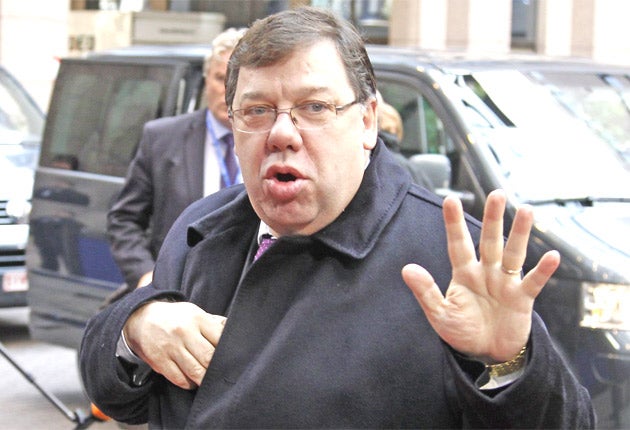No bailout yet, but no end in sight for Ireland's troubles

There was little sign of an early conclusion to Ireland's economic crisis last night, after a tense meeting of European finance ministers in Brussels broke up without agreeing a bailout package. The EU's economic and monetary affairs commissioner, Olli Rehn, said that Ireland, the European Central Bank and the IMF have stepped up talks about a "potential programme, were it to be requested by a member state".
Despite officials insisting that "we will take action to safeguard the financial stability of the euro, if that is needed," no immediate measures are expected soon. A situation of continuing uncertainty is unlikely to calm fractious markets in coming days.
Rumours yesterday had suggested that the parties had been discussing a €100bn (£85bn) package.
Before yesterday's meeting, the finance ministers from the 16 nations that use the euro were said to have indicated support for Dublin's austerity measures and expressed readiness to help financially, if Ireland asks for aid – a point reiterated by Jean-Claude Juncker, chairman of the Eurogroup of 17 nations using the euro. He said last night that the bloc had the means to help Ireland, "were it to make a request for assistance". In Dublin, the Prime Minister, Brian Cowen, again rejected calls to request a bailout to prevent "contagion" spreading to other EU nations such as Spain and Portugal, and even overwhelming the euro itself. He repeated that his government is fully funded until the middle of next year, and underlined that it was Ireland's banks, rather than the government itself, that needed assistance: "The cost of money is simply too high," said Mr Cowen, although Ireland's banks have been able to count on relatively cheap funds from the ECB. A four-year fiscal plan will be announced next week, ahead of planned budget on 7 December.
Mr Cowen betrayed little sense of urgency in his statement to the Irish parliament yesterday, promising only that his ministers would be talking "with our European counterparts to see in what way market risks can be taken out of the equation".
He declined to elaborate further. Apparently well-informed speculation suggests that the Irish government is seeking a face-saving deal whereby the rescue funding from the European Financial Stability Fund would be labelled as funding for Ireland's busted banks, and channelled to them via the Dublin government.
Given that many of those banks have been nationalised, and that all are covered by a blanket state guarantee to depositors and bondholders, many observers will regard this distinction as making little real difference.
Join our commenting forum
Join thought-provoking conversations, follow other Independent readers and see their replies
Comments
Bookmark popover
Removed from bookmarks